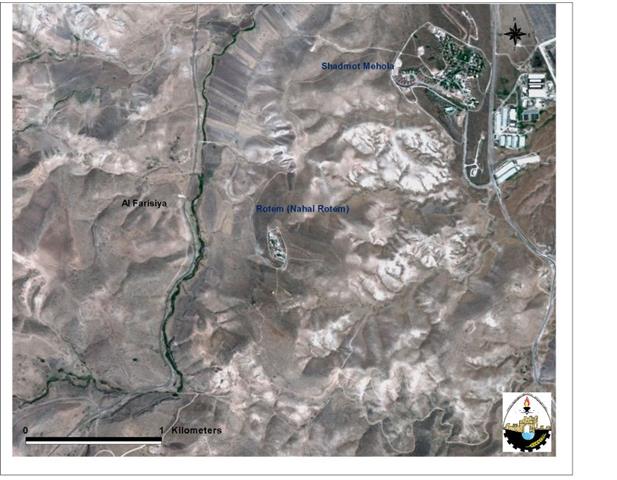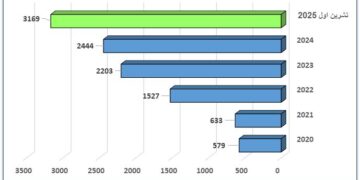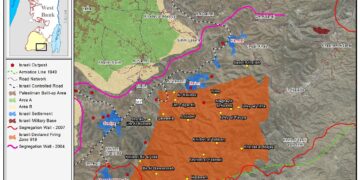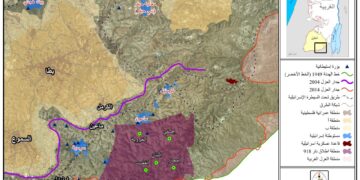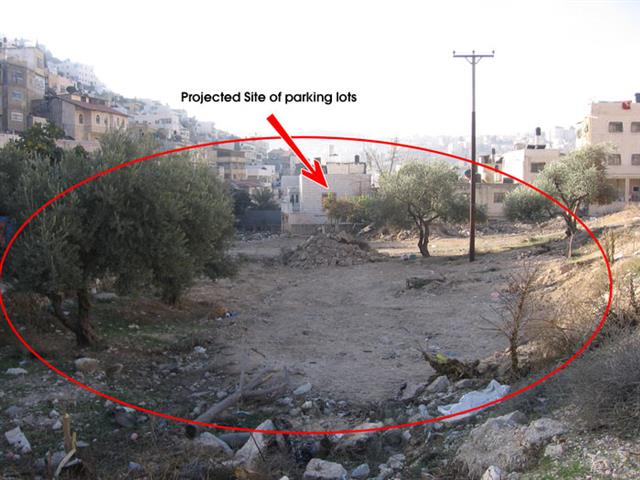The Jordan Valley is situated in the eastern part of the West Bank and includes the middle and lower parts of the Jordan Valley and the upper part of the Dead Sea western shores. This region has a rich blend of geologic formations, diverse plant and animals species, diverse flora and fauna, as well as an ancient human history. It occupies an area of 1640 km�² and it has a total population of 52,132 inhabitants (PCBS, 2005).
The Israeli assaults in the Jordan Valley;
The Israeli Occupation Force (IOF) has escalated its assaults and violation to the Human Rights against the Palestinian civilians in the Jordan Valley. Human Rights violations perpetrated by the Israeli forces included house demolitions, destruction to the sheds where the local Palestinians market their agricultural productions, knocking down animal barracks under the pretext of being un-licensed, land confiscation, preventing the local villagers from accessing their own lands and controlling the movement of Palestinians to and from the Jordan Valley by erecting several checkpoints and roadblocks. Following are a set of incidents which took place since October 2005.
-
On October 10th, 2005, Israeli contractors stole huge amount of agricultural soil from Al Joubiya area in Ein El Bayda village in the northern Jordan Valley and transport it to the inside of the settlements at favor of using it for the settlers gardens and for construction purposes.
-
The Israeli soldiers at Tayaser checkpoint tried to sell a small herd of sheep that were confiscated from Palestinian shepherds from Al Aqaba village east of Tubas city.
-
The Israeli occupation forces (IOF) issued tickets for Palestinians driving on Road # 90 near the Jordan River east of Tubas city.
-
In October 2005, the Israeli forces demolished several numbers of caravans and barracks near 'Atouf village east of Tubas. In the same time, In October, 2005, the Israeli bulldozers razed lands near Hemdat settlement on the eastern side of Al Baqia'a valley, east of Tubas Governorate. In addition the Israeli forces bulldozed agricultural lands and a small hill in the same region.
-
In October, 2005, the Israeli occupation forces confiscated the ID cards of Palestinian shepherds that live in Al Aqaba village east of Tubas city.
-
In October, 2005, the IOF has confiscated Palestinian lands in Bardala village in the upper part of the Jordan Valley to construct a permanent checkpoint.
-
On November 20th, 2005, The Israeli soldiers prevented any Palestinian from crossing the checkpoints of AL Hamra and Tayaseer if they were not residents of Jordan Valley villages.
-
In November 2005, the Israeli authorities notified the owners of the sheds in the Northern Jordan Valley (east of Tubas city) on both sides of road # 90 near Bardala, Kardala and 'Ein El Bayda villages of their intention to demolish their sheds.
-
In November 2005, the IOF confiscated cows and sheep in the villages of Al Hamamat and Wadi El Maleh east of Tubas city.
-
The Israeli forces hindered the entering of goods and agricultural productions to the northern Jordan Valleys east of Tubas. (See photos one and two).
-
In December 2005, the IOF took over 48 dunums of lands in Wadi El Maleh area east of Tubas city for military use and prevented Palestinian land owners from accessing their lands.
-
In December 2005, The Israeli settlers of Rotem settlement hindered Palestinian farmers from accessing their grazing lands under the threat of weapons in Wadi El Maleh area. See Map 1
-
In December 2005, the Israeli chief commander in Jericho forced owners of commercial stores and stalls located on road #90 to close their shops under the threat of weapons.
It is needless to say here that the Palestinian citizens in the Jordan Valley are daily facing the Israeli harsh policies. It is feared that the continuing strangulation of the Jordan Valley area will chock its residents out of it.
Furthermore, the Jordan Valley is of vital importance to the Palestinian economy. The daily harassment and hardships imposed by the Israelis is meant to strangulate the Palestinian communities in the Jordan Valley. The Israeli authorities hope that these harsh measures will depopulate the valley from its Palestinian citizens. In other words, they aim to affect a slow transfer or ethnic cleansing of the area. The current onslaught marks a new and dangerous phase in Israel's attempts to truncate the size of a future Palestinian State and compromise its viability.
The Israeli colonization activities in the Jordan Valley;
More recently, Israeli occupation authorities have concentrated their colonizing activities in the Jordan valley to expand the Israeli settlements and increase the settler's population. In June 2005, the Israeli Minister of Agriculture, Yisrael Katz adopted a plan to double the number of Israeli settlers living in the Jordan Valley area over the next two years. The plan includes increases in the agricultural subsidies including the support of five types of plants and two kinds of livestock as well as development of additional tourism facilities in the area. The plan was coordinated with the office of Prime Minister Sharon and had already been approved by the Ministry of Finance. The plan will cost around $32 million dollars.
Furthermore, the Israeli government offered more incentives to the settlers of these settlements which include large amounts of grants and long term agricultural loans and uncontrolled water consumption with reduced prices in addition to the irrigation water that they get for free, while the Palestinian communities there are deprived from drilling additional wells or even utilizing the wells they already have.
Today, the Israeli government has started to implement the aforementioned plans. After the mid of 2005, the Israeli authorities have seized more than 1000 dunums of Palestinian lands in Wad El Maleh in the northern Valley east of Tubas city and added them to Rotem settlement, in addition to surrounding them with a fence. Whereby another construction activities are taking place in the nearby settlements of Maskiyyot (which is located 1 km south of Rotem) and Beqaot located along the bypass road #508 few kilometers north of Al Hamra checkpoint. (See map one) Additionally, intensive expansion activities are taking place in Mehola settlement south of Kardala village in the northern part of the Jordan Valley, particularly in the southern part of it.
After Gaza disengagement in September 2005, Ilan Cohen, the director-general of the Israeli Prime Minister's office, has approved a plan to establish a new settlement in the northern part of the Jordan Valley for the Ultra-Orthodox settlers that were evacuated from Shirat Yam settlement that was located by the Mediterranean in Gaza Strip. See Map 2
Conclusion
Settlements expansion in International law
These Israeli colonization activities are blatant violations of international law and the Roadmap peace plan. The Roadmap demands that the Israeli Government â??freezes all settlement activity (including natural growth of settlements).â?? In fact, instead of limiting settlement construction, Israel has accelerated settlement expansion making the creation of a viable, contiguous and independent Palestinian state a near impossible task. The international community and the Quartet, however, have been utterly incapable of enforcing Israeli compliance to the Middle East Peace Process.
Israel's colonization program violates the most important document of international humanitarian law Рthe Fourth Geneva Convention Relative to the Protection of Civilian Persons in a Time of War. In particular, Israel's settlements are built, and expanded, upon appropriated Palestinian land. Settlement construction is often preceded by military action, including the destruction of Palestinian property such as homes or olive groves. The destruction of civilian property is prohibited by Article 53 of the Convention which states that: ̢??Any destruction by the Occupying Power of real or personal property belonging individually or collectively to private persons, or to the State, or to other public authorities, or to social or cooperative organizations, is prohibited, except where such destruction is rendered absolutely necessary by military operations̢??.
The Destruction of Civilian Property in International Law
As an occupying power, Israel is bound by the application of international humanitarian law. Policies targeting civilian property, however, including Palestinian homes and agricultural land, violate the most basic tenets of the international legal regime.
The demolition of Palestinian homes, destruction of agricultural and seizure of private lands is explicitly outlawed by The Hague Conventions of 1907. Convention IV, Article 23 (G) clearly states that the occupying power is forbidden â??to destroy or seize the enemy's property, unless such destruction or seizure be imperatively demanded by the necessities of war.â??
Prepared by
The Applied Research Institute – Jerusalem
ARIJ


